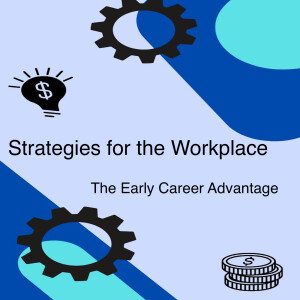Strategies for the Workplace
These podcasts will help you develop key workforce skills: • Effective Communication • Teamwork and Collaboration • Problem Solving and Critical Thinking • Decision Making • Time Management • Adaptability and Resilience • Technical Literacy • Career Planning • Professionalism Each episode is applicable in many industries and are ‘evergreen’, relevant and appropriate over time. Each episode starts with a brief overview of a concept, which is followed by an application section that either goes into greater detail or discusses how the idea can be applied more broadly. There is an expression, “Experience is what you have just after you need it.” Particularly early in your career, you will be exposed to many new professional situations, and you will learn things and gain insights in the process. Unfortunately, because the terminology, business challenge, or interpersonal dynamic will be unfamiliar to you, your ability to engage, contribute, or lead will be less than you wish. After all, it is hard to be confident, poised, and show executive and management potential when you may feel unsure of the territory. These episodes are intended for a professional in the early stage of his or her career. Whether unfair or not, the pool of young professionals in any organization is observed by executives and quickly sorted into those with more management potential and those with less. The folks with promise are quickly moved into the position of team leader or first-line manager. This gives those selected a career advantage because they get to practice leading and managing. They are also exposed to the ‘management curriculum’, a set of topics that entry-level staff do not work through. My hope is that digesting the material in this book will better equip you to engage and your performance will mark you for advancement.
Episodes

4 days ago
4 days ago
Most sales organizations subdivide the market, assigning representatives to target customers by geography, industry, or company size. Further, a sales team may task some people to work with specific customers or prospects (‘named accounts‘) and other people to work with everyone else. You should know how your organization’s sales force is assigned.

Tuesday Feb 03, 2026
Tuesday Feb 03, 2026
This sports metaphor refers to the practice of shifting to low-risk, defensive, and time-consuming activities as a tactic to preserve a desirable position until the window of opportunity to unsettle matters passes. Basically, the goal is to keep what you have until the chance of losing it is over. In sports, a team that is ahead might slow the pace of play or assume a defensive posture to hold on to the lead until the game is over. Regarding personal or corporate conduct, it may be prudent to do little while exposed and wait for a better time to act boldly.

Tuesday Jan 27, 2026
Tuesday Jan 27, 2026
Project scheduling is a rich field, but in a nutshell: projects consist of activities that consume resources and have associated costs. An activity can be almost anything, although typically, someone does something. Resources are often people’s labor, though they can also be machines, facilities, etc. The start of one activity may depend on the completion of one or more other activities. Given that everything can’t happen at once, a project winds up being a succession of activities that consume time, resources, and money.

Tuesday Jan 20, 2026
Tuesday Jan 20, 2026
Should you need to announce a decision to a team or organization, you have several options:
Tell each person individually, in private.
Tell everyone at the same time.
Tell some people, charging them to tell others.
Tell only those who need to know.
The point is not which method is best or that this is an exhaustive list. The point is to have a method and be transparent and consistent (as appropriate) about how communications are made.

Tuesday Jan 13, 2026
Tuesday Jan 13, 2026
Analyze every task before proceeding. If you have no choice, at least you know what you might be getting into. If you have a choice, the analysis may lead you to embrace or avoid the work.

Tuesday Jan 06, 2026
Tuesday Jan 06, 2026
“I’d rather have spent more than I needed to than less than I should have.”
While this advice may seem self-evident and trivial, the point is to pause and evaluate risk rather than simply agree that risk exists and then dismiss adverse events as unlikely and therefore immaterial. It never hurts to ask yourself, “What could possibly go wrong?”, to inform a decision. Decision over-optimism is not good, and neither is decision paralysis.

Tuesday Dec 30, 2025
Tuesday Dec 30, 2025
Determine whether you might benefit from historical data and can gather it or whether you have a novel situation where historical data has no bearing on a forecast.

Tuesday Dec 23, 2025
Tuesday Dec 23, 2025
By adopting a standard, each party, gains access to the other parties — no need to incur a customization cost for each integration. As the network grows, competition reigns, innovation is rewarded, and efficiency is maximized.

Tuesday Dec 16, 2025
Tuesday Dec 16, 2025
Recognize that single points of failure and other concentrated risk can exist and to mitigate them through redundancy, distributing authority, and so on.

Tuesday Dec 09, 2025
Tuesday Dec 09, 2025
Approach others’ statistics with a degree of skepticism and try to understand what is being reported, and perhaps why it is being stated a particular way. Similarly, consider how you should report your statistics.






